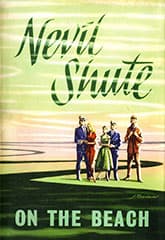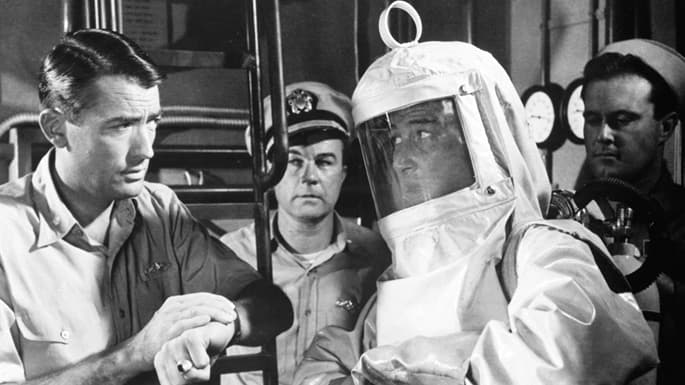On the Beach
Critique • Quotes • At the movies
 First edition
First editionFirst publication
1957
Literature form
Novel
Genres
Literary, post-apocalyptic
Writing language
English
Author's country
England
Length
Approx. 94,500 words

Gregory Peck, left, leads the cast playing survivors—for now—of a nuclear holocaust.
Gentle eulogy for a self-destroyed world
On the Beach (1959): Film, 134 minutes; director Stanley Kramer; writers John Paxton, James Lee Barrett; featuring Gregory Peck, Ava Gardner, Anthony Perkins, Fred Astaire
The strengths and weaknesses of the famous 1959 film On the Beach are the same as those of the famous novel On the Beach.
The world is ending after a nuclear holocaust, death is blowing in the winds closer to Melbourne, Australia, where huddle the last known remaining humans on earth. They know they have only a few months to live. And yet, except for a few outbursts at a cocktail party, everyone accepts impending death in most civilized fashion. No rioting in the streets. No reverting to savagery with individuals trying to save themselves or to get what they can before the end. No one even quits a job to spend a little extra time with family or to go on a final binge. Rather, everyone just carries on doing his or her duty, as much as possible living every day exactly as they always have.
Two characters in the film are in denial more seriously than the rest. Submarine commander Dwight Towers (Gregory Peck) talks about his family back in America as though they are still alive, while he's being seduced by local lush Moira Davidson (Ava Gardner). New mother Mary (Donna Anderson) keeps avoiding discussions of their imminent demise with her husband, Aussie navy man Peter Holmes (Anthony Perkins). Much of the drama of the film, as in the book, consists of these two being brought to face reality. (In one difference from the novel however, Peck's character eventually gives in to Gardner's seduction, while Shute's commander remains faithful to his wife's memory.)
Most of Shute's subplots, involving couples and families facing up to their fate with good humour and sweet sentimentality, have been dropped in the interests of keeping the film down to a little over two hours. But we get the idea from the few lesser characters that are retained in the film. The only one who aims to go out in a blaze of glory is a guilt-ridden scientist and racing enthusiast played by Fred Astaire, who is too old for the book's character but effective nonetheless.
The action-oriented drama, as in the novel, centres on a submarine trip to study the atmosphere in the northern hemisphere, as well as to investigate a mysterious signal coming from San Diego. On the American west coast the movie camera shows no devastation, just cities bereft of human presence. Death appears to have come quietly to humankind and with none of the messiness of warfare as we know it. As other commentators have remarked, the visual evidence on the screen could indicate any disaster had taken place—a plague, a meteor, global warming.... It hardly seems a warning against the terrors of war in the nuclear age.
But you have to think of the impact these scenes must have had on the movie-going public of the late 1950s and early 1960s. The end of civilization due to war had seldom been considered before, let alone been shown on the big screen. The sight North America carrying on without humanity was truly shocking, a blow to the blinkered, optimistic mindset that had dominated the years since the end of the Second World War.
Hollywood's over-excited trailer for the 1959 film ofOn the Beach.
And somehow this emptiness, this lack of devastation, seems appropriate to Shute's vision. His warning is not meant to scare us into avoiding warfare, with all its destruction and suffering, but rather to sadden us that all our individual hopes and dreams could come to a sudden end.
Back in Melbourne, a Salvation Army-style crusade tries to drum up converts to religion before it's too late. But even this evokes little passion. A few people come forward but as radiation sickness starts taking its toll, the numbers who attend the crusade grow smaller until, in the end, the banner proclaiming "THERE IS STILL TIME, BROTHER" is left flapping for no one but the movie audience.
The film has dated poorly, as we have since become used to much more dramatic and explicit depictions of disastrous futures. But it still works as a human drama, a kinder gentler apocalyptic vision.
One detail that mars it however is the continual playing of "Waltzing Matilda". At first the catchy tune is sounded as the submarine first enters harbour to indicate it has reached Australia, but then it continues in myriad forms throughout the movie, including one awfully sentimental scene at a fishing camp where pleasantly drunk men sit by the old stream singing verse after verse of the national song, without a note of irony, providing an aural backdrop for Peck's surrender to Gardner's charms.
On the Beach, in both novelistic and movie form, has sometimes been credited with having launched the peace movement of the 1960s. I think this is a gross exaggeration. Like the novel, the film is hardly a call to arms against arms. Rather it's about personal battles that are fought while the eulogy for mankind is being prepared.
As readers and viewers we come to care about the people we meet in the extraordinary context of this story, more than we care about the context. Some of us may have been moved by this to question the direction the world was moving in (and may still be moving in) but the calls to energetically take up the struggle for change would come from elsewhere.
— Eric

